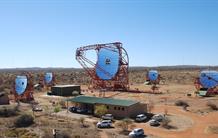The electronics developed by IRFU now equips the four oldest gamma-ray telescopes of H.E.S.S. (High Energy Stereoscopic System) in Namibia. Making it possible to optimize the simultaneous operation of all five H.E.S.S. telescopes, and confirming the technical choices for its successor CTA (Cherenkov Telescope Array).
?The electronics of the cameras of the four "small" telescopes of the H.E.S.S. observatory have been upgraded to the level of the fifth telescope, which had been commissioned 15 years later in 2012. The 12-meter telescopes and the 28-meter one will now collaborate to identify the high energy photons of the cosmos.
This new electronics reduces the camera dead time from a few hundred to ten microseconds. This time period corresponds to the processing of an "event" before the acquisition of the next. The five telescopes will now operate as part of a synchronized and optimized network.
More concretely, the H.E.S.S. cameras are organized into modules of 16 photodetectors, each associated with an innovative "Nectar" readout chip developed by IRFU for both H.E.S.S. and CTA. Nearly 4,000 chips were delivered for H.E.S.S.
H.E.S.S.'s upgrade began in 2013. The four new electronics were installed in the summer of 2016, and they recorded their first gamma source in January 2017. H.E.S.S. is now fully operational and prepared to harvest outstanding results.
This success also confirms the choice of the Nectar electronic chip to equip about 15 cameras of the future CTA observatory, whose installation will begin in 2018.
This project was carried out under the stewardship of Deutsches Elektronen-Synchrotron (DESY) in Zeuthen, Germany, in collaboration with LPNHE (Paris 6 University and Paris 7 University, CNRS), the Leprince-Ringuet Laboratory (École Polytechnique, Université Paris 11, CNRS) and the University of Leicester, UK.
Contacts :
Jean-François Glicenstein (SPP), Eric Delagnes (Sedi)
• Structure and evolution of the Universe
• The Electronics, Detectors and Computing Division • The Particle Physics Division




